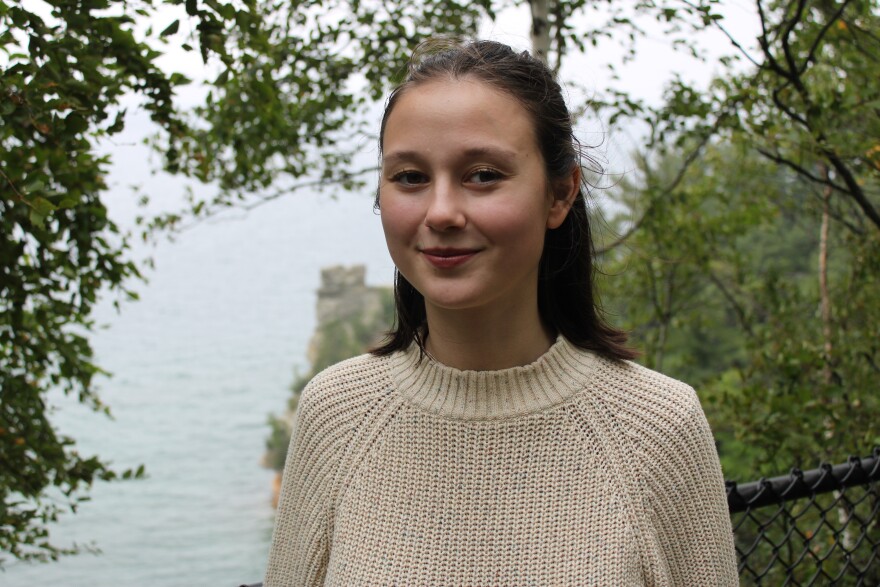Below is a transcript of our conversation with CMU student Masha Smahiluk:
David Nicholas:
I'm David Nicholas and this is Central Focus, a weekly look at research activity and innovative work from Central Michigan University students and faculty. Russia’s war on Ukraine began in 2014, and the date marking the escalation of that conflict, February 24th, 2022, is less than a week away. Masha Smahliuk came to Mount Pleasant as an exchange student for her senior year of high school. That one year has become 3 1/2 years, and she is currently studying journalism at CMU. I had the chance to talk with her about her personal connection to events 5000 miles away…
The conflict that had been simmering since 2014, and we said before, we've rolled tape that you were aged 9 at the time. You have any memories of those years prior?
Masha Smahliuk:
I actually do. That's how I was kinda inspired to be a journalist because when I was 9, like I remember my family was all in the living room, like talking about something and I was in the bedroom watching TV and, on the TV, 'cause it was also the Revolution of Dignity. And I remember, just like Maidan was fires. Dark night. So many people. Um, those like shields of steel and then at that time, militia police was attacking the protesters. Yeah, it was very scary. And like I remember crying. And I was like, I don't want to have the war. But that's…
David Nicholas
How (how) close was, to (to) pinpoint your hometown and its proximity to where the fighting was going on, even back in that early age.
MS:
So thankfully in 2014 it wasn't close. So, I'm my oblast is region is called Kirovitskya. And so, we're the very center of Ukraine. So, we're like a little bit down from Kiev and a little bit up from Odessa, and Russia first occupied Crimea and then occupied Danyetsk and Luhansk oblasts like parts of them. So they were more in the east, so…
DN:
The events of February 22. Talk about that. When all of that came together.
MS:
So, I arrived in September 2021. And then the full-scale invasion started in February 24th, 2022, the worst day in my life. When I woke up, I remember, like, crying and calling all of my family and was really scared because all the territory of Ukraine was being bombed. And I think like a unique thing and a difference between Ukrainians and Russians in that in Ukraine, only like 30 million people population. So, there is like no person who doesn't know, someone who has been affected, or who, you know, we all know someone whose house has been bombed or who is in the army. That's why I think Russian people don't feel it that way because they have what, over 100 million people? For them, it's like somewhere there. It's like not at their home.
DN:
And this is perhaps a tough question to ask, but I feel that I should. Have you lost people very, very close family or friends, extended relatives and the like?
MS:
No. Thank God, I hope it will never happen. Now my family is all OK. They're working, they're at home.
DN:
Have you started thinking at all of what happens once your college studies are done, what, what that next step may be? There, there is still some time there and none of us can predict what will happen in your home country. And with the conflict. But what do you think might be next for you?
MS:
I'm thinking of still doing a master’s degree here. And then I want to work as a journalist. Either in America talking about Ukrainian news or somewhere in Europe. But honestly, I’m not sure. It's kind of I'm hoping, of course, that the war ends, and as soon as the war ends, I'm going back to visit everyone. But then job wise I think I'm also lucky in this way to have American education, because now I have like the whole world in front of me. I can go anywhere where I want.
DN:
And there are some bright shining spots of (of) encouragement and hope. And I think yours is one of them. Thank you very, very much for sharing the story with us.
MS:
Thank you so much. Yeah, and I think it's also my story is more about story of people of kindness because I was supported and all of throughout all of my way. I didn't do anything. I had people who have always been very kind to me, my host, family and people at CMU. So I'm really grateful and I'll be forever grateful to them.
DN:
The extended thank you to all for making the story possible. Then we do appreciate the time and you sitting down with us. You. Thank you.
MS:
Thank you so much!




